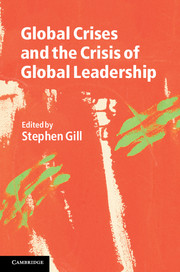Book contents
- Frontmatter
- Contents
- Contributors
- Acronyms
- Acknowledgements
- Introduction: global crises and the crisis of global leadership
- Part I Concepts of Global Leadership and Dominant Strategies
- 1 Leaders and led in an era of global crises
- 2 Leadership, neoliberal governance and global economic crisis: a Gramscian analysis
- 3 Private transnational governance and the crisis of global leadership
- Part II Changing Material Conditions of Existence and Global Leadership: Energy, Climate Change and Water
- Part III Global Leadership Ethics, Crises and Subaltern Forces
- Part IV Prospects for Alternative Forms of Global Leadership
- Glossary
- Bibliography
- Index
1 - Leaders and led in an era of global crises
from Part I - Concepts of Global Leadership and Dominant Strategies
Published online by Cambridge University Press: 05 June 2012
- Frontmatter
- Contents
- Contributors
- Acronyms
- Acknowledgements
- Introduction: global crises and the crisis of global leadership
- Part I Concepts of Global Leadership and Dominant Strategies
- 1 Leaders and led in an era of global crises
- 2 Leadership, neoliberal governance and global economic crisis: a Gramscian analysis
- 3 Private transnational governance and the crisis of global leadership
- Part II Changing Material Conditions of Existence and Global Leadership: Energy, Climate Change and Water
- Part III Global Leadership Ethics, Crises and Subaltern Forces
- Part IV Prospects for Alternative Forms of Global Leadership
- Glossary
- Bibliography
- Index
Summary
Summary
This chapter introduces different concepts of crisis, tracing them to two distinct roots. The first derives from medical discourse, indicating a turning point in an illness, a moment when a patient either goes on to die or starts to recover. It signifies a moment of emergency or danger, such as the response of leaders following 9/11 or to the global financial crash since 2008 – two states of exception or emergency involving extraordinary measures previously thought to be unlikely if not impossible. These measures are justified by the need to preserve a ‘civilization’ or a way of life as defined by its political leaders. The second meaning of the word ‘crisis’ has an eschatological sense, as in the collapse of communist rule in eastern Europe, when Western triumphalism proclaimed the ‘end of history’, with all possible alternatives to liberal capitalism as a governing strategy seemingly exhausted. Nonetheless, if the deep crisis of global accumulation (and its links to society and ecology) is structural it will necessitate much more radical changes than if it is simply a crisis associated with the business cycle remedied through macroeconomic stabilization by G20 governments. This situation, therefore, opens up opportunities for imagining new and progressive forms of global leadership.
Introduction
I start with five preliminary points of introduction before reviewing in more detail some of the key contributions to this volume.
- Type
- Chapter
- Information
- Global Crises and the Crisis of Global Leadership , pp. 23 - 37Publisher: Cambridge University PressPrint publication year: 2011
- 2
- Cited by



